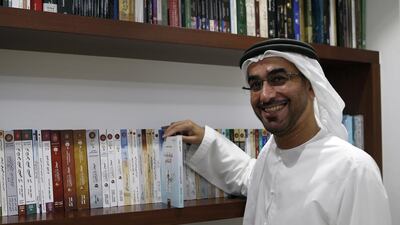‘In a small room in an unknown place, there is someone peeping through a keyhole, watching furtively the other person in an adjacent room...”
This is how the Arabic language novel Ghurfa Waheda La Takfi (One Room is Not Enough) begins, by the Emirati writer and researcher Sultan Al Ameemi. It has been nominated for the 10th edition of the prestigious International Prize for Arabic Fiction (Ipaf), with 15 competing novels from nine other countries.
Ghurfa Waheda La Takfi is an unusual novel, full of mystery, suspense and a philosophical narrative. It is also written in simple, engaging Arabic, peppered with a creative play on words – reflective of the author's poetic background.
His novel provokes an engaged curiosity from the outset: who is the person trapped in a room watching someone else; a doppelgänger in yet another room. And who is really telling the story with its multiple narrators?
Al Ameemi, 43, is a poet and writer, as well as a researcher of local dialects, and the director of the Poetry Academy in Abu Dhabi. He has written 20 books, mostly on UAE poetry and poets, as well as three collections of short stories and a novel P.O. Box 1003 (2014). Al Ameemi is also a judge on the Abu Dhabi TV and Million's Poet Channel Million's Poet show.
Tell us about Ghurfa Waheda La Takfi (One Room is Not Enough), the first Emirati novel longlisted for the 10th edition of the International Prize for Arabic Fiction? Why did you write it?
I have been thinking about this concept of “talasus”, peeking or peeping into other people’s lives, for a long time. Our life revolves around talking about others, watching others and checking out people’s lives, through social media and gossip. We are curious and check people’s accounts to see what they have been up to and what did we miss out on. It is almost like an obsession, and so I started writing the book with this premise.
There are things in the novel from my own life, and from stories I heard during my research into oral history and folklore.
I leave it to the reader to decide what is the aim of the book, but I admit that I intended to confuse the reader and keep them guessing and wondering who is who and what is the relation of this character to the other.
It is a mystery and I hope people enjoy it. I am very happy One Room is Not Enough has been nominated, as this is an important boost for local work, and it is an important encouragement for myself to write an even better novel next time, regardless of the outcome of the nomination.
When did you start writing and whose writings have had the biggest influence on you?
It was my former headmaster, Dr Salim Zayed, who is now a professor, who first believed in my writing when I was just a teenager. He said: “I see the gift of writing in this boy.” My father Ali bin Bakheet is also a poet.
Since the age of 16, I have always been very curious and sought the works of poets in the UAE and the Arab world before I started exploring the works of literary giants from around the world.
I admire the work of the Japanese writer Yasunari Kawabata, who won the Nobel Prize in Literature in 1968; José de Sousa Saramago, the Portuguese writer who won the Nobel Prize in Literature for 1998, and the Russian, Anton Chekhov.
I appreciate the way they convey human interactions and their use of words that play with your heart and mind. I particularly enjoy peculiar stories, in which the reader is kept on his toes and is engulfed in the plot.
From the Arab writers, I love the work of Lebanese-French Amin Maalouf and the Palestinian Ghassan Kanafani. I like the way in which these different writers added a different domain to historical events, and how issues that matter to all Arabs, like identity and struggle, are conveyed in a universal way that reaches all readers.
What is next for you? What are you currently working on?
I may be getting a parrot and I will teach him to speak the local dialect. Studying dialects is one of my favourite subjects and I am continuing my work, which I started over a decade ago, researching and putting together a dictionary or multi-section encyclopedia on the dialects in the UAE.
So far, the dictionary has more than 8,000 pages worth of words and research. We have more than 20 Emirati dialects, and so it is a lot of work, but so interesting, and every day I learn something new.
I fall more and more in love with our Arabic language.
There is a plan for a show this year, hosted by me, perhaps during Ramadan, on some of the origins of words and what they mean. But details are yet to be confirmed.
I already have some idea for the next novel, and at this point, all I can tell you is that it will include a crow.
What is your advice to young Emirati writers?
Keep writing and writing. Take a whole year to develop the novel, before actually writing it down. Discover yourself, through your writing, and strive to always challenge and improve yourself. I re-edit every new edition, and find that no, it still needs work.
And most importantly, read and read and read. I meet too many writers who don’t even read.
• Ghurfa Waheda La Takfi (One Room is Not Enough) by Sultan Al Ameemi is published in Arabic by Difaf Publishing and Editions El-Ikhtilef (Dh50).
Rym Ghazal is a senior feature writer with The National.

